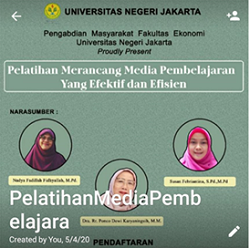Pengembangan Masyarakat: Merancang Media Pembelajaran yang Efektif dan Efisien Bagi Guru di Masa Pandemi Covid-19 Community Development: Designing Effective and Efficient Learning Media for Teachers during Pandemic Covid-19
Main Article Content
Abstract
The Covid-19 pandemic, which has spread throughout the world, has had a significant impact on various sectors, one of which is the education sector. Schools must ensure to continue the learning process even though in any difficult and limited situations. Based on the interviews, observations, data analysis, and identification of the problems, we found some problems relates to these; suddenly changes to new learning models (school from home) caused by Covid-19 Pandemic, the lack of teacher’s competence in designing creative instructional media, and the lack of teacher’s training in designing media learning. Thus, teachers are required to design effective and efficient learning media as creative and innovative distance learning. This community service aims to help vocational teachers in Jakarta, Bogor, Depok, Tangerang, and Bekasi improve their competence and skills by designing effective and efficient PowerPoint as a learning media. This activity is designed through a webinar with a zoom application.
Downloads
Article Details
Authors who publish with this journal agree to the following terms:
- Any article on the copyright is retained by the author(s).
- Author grant the journal, right of first publication with the work simultaneously licensed under a Creative Commons Attribution License that allows others to share work with acknowledgment of the work authors and initial publications in this journal.
- Authors are able to enter into a separate, additional contractual arrangements for non-exclusive distribution of published articles of work (eg, post-institutional repository) or publish it in a book, with acknowledgment of its initial publication in this journal.
- Authors are permitted and encouraged to post their work online (e.g., in institutional repositories or on their websites) prior to and during the submission process, as can lead to productive exchanges, as well as earlier and greater citation of published work.
- The article and any associated published material is distributed under the Creative Commons Attribution-ShareAlike 4.0 International License
References
Avgerinou, M.D., Moros, S.E. 2020. The 5-Phase Process as a Balancing Act during Times of Disruption: Transitioning to Virtual Teaching at an International JK-5 School MARIA. In Teaching, Technolgy. and Yeacher Education During the Covid 19 Pandemic. Waynesville: The Association for the Advancement of Computing in Education.
Cheng, C.H., Su, C.H. 2012. A Game-based learning system for improving student's learning effectiveness in system analysis course. Procedia - Social and Behavioral Sciences. 31:669-675. https://doi.org/10.1016/j.sbspro.2011.12.122
Gonçalves, A.D.S., de Araújo, V.L., Pereira, S., Moreira, I.X. 2017. Utilizing Audiovisual Media And Learning Motivation On Student Achievement Of Social Department Grade Viii Student Fatumeta, Dili. International Research-Based Education Journal. 1(1):5-14. http://dx.doi.org/10.17977/um043v1i1p%25p
Hamid, M.A. 2016. Pengembangan Instrumen Penilaian Hasil Belajar Siswa Berbasis TIK pada Pembelajaran Dasar Listrik Elektronika. Volt: Jurnal Ilmiah Pendidikan Teknik Elektro. 1(1):37-46. http://dx.doi.org/10.30870/volt.v1i1.822
Heinich, R., Molenda, M., Russel, J.D., Smaldino, S.E. 2002. Instructional Media and Technologies for Learning. New Jersey: Prentice-Hall Inc.
Mas’ud, M. 2012. Membuat Media Pembelajaran dengan Lectora Inspire. Yogyakarta: Skripta Media Creative
Miarso, Y. 2011. Menyemai Benih Pendidikan. Jakarta: Prenadamedia Grup
Miller, A.D., Ramirez, E.M., Murdock, T.B. 2017. The influence of teachers’ self-efficacy on perceptions: Perceived teacher competence and respect and student effort and achievement. Teaching and Teacher Education. 64:260-269. https://doi.org/10.1016/j.tate.2017.02.008
Munirah. 2018. Peranan Guru dalam Mengatasi Kesulitan Belajar Siswa. Tarbawi: Jurnal Pendidikan Agama Islam. 3(2):111-127.
Nurrita, T. 2018. Pengembangan Media Pembelajaran Untuk Meningkatkan Hasil Belajar Siswa. Misykat: Jurnal Ilmu-ilmu Al-Qur’an, Hadist, Syariah dan Tarbiyah. 3(1):171-187. http://dx.doi.org/10.33511/misykat.v3n1.171
Nurseto, T. 2011. Membuat Media Pembelajaran yang Menarik. Jurnal Ekonomi dan Pendidikan. 8(1):19-35. https://doi.org/10.21831/jep.v8i1.706
Purba, M.E. 2019. Efektivitas Penggunaan Multimedia Terhadap Peningkatan Motivasi Belajar Siswa Kelas X SMA Negeri 7 Padangsiidmpuan. Jurnal Edugenesis. 1(1):26-35
Rusman. 2014. Model-model Pembelajaran. Jakarta: Raja Grafindo Persada
Siregar, E., Nara, H. 2010. Teori Belajar dan Pembelajaran. Bogor: Ghalia Indonesia
Susanto, H. 2014. Communication Skills. Yogyakarta: Deepublish
Susilana, R., Riyana, C. 2009. Media Pembelajaran: Hakikat, Pengembangan, Pemanfaatan, dan Penilaian. Bandung: Wacana Prima
